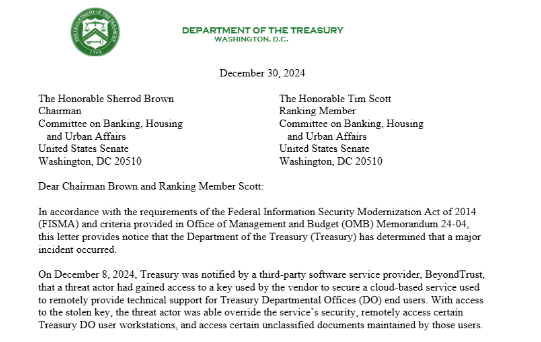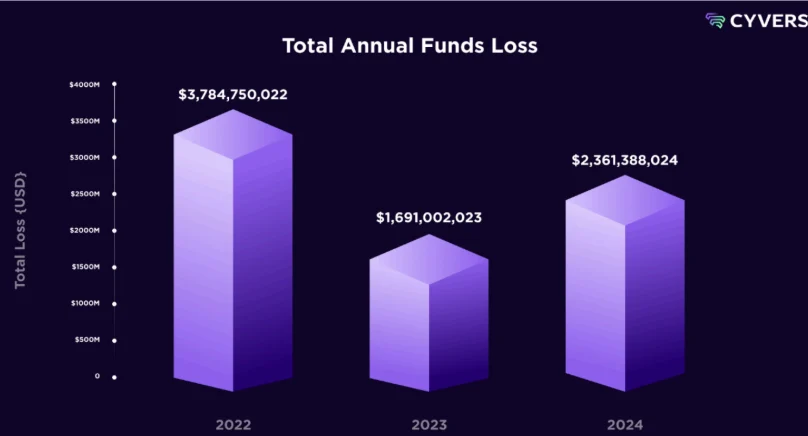 CaryptosHeadlines Media Has Launched Its Native Token CHT.
Airdrop Is Live For Everyone, Claim Instant 5000 CHT Tokens Worth Of $50 USDT.
Join the Airdrop at the official website,
CryptosHeadlinesToken.com
CaryptosHeadlines Media Has Launched Its Native Token CHT.
Airdrop Is Live For Everyone, Claim Instant 5000 CHT Tokens Worth Of $50 USDT.
Join the Airdrop at the official website,
CryptosHeadlinesToken.com
While the China-US tensions intensify, Vietnam thwarted a major crypto scam that was orchestrated by Million Smiles, a fraudulent company promoting a fictitious token. In South Korea, the arrest warrant for impeached President Yoon Suk Yeol rattled the crypto market. Meanwhile, Malaysia intensified its crackdown on unregistered crypto exchanges by ordering Bybit to cease operations in the country.
Treasury Breach Sparks Tensions Between US and China
A recent cybersecurity breach at the United States Treasury was attributed to a Chinese state-sponsored Advanced Persistent Threat (APT) actor, though the Chinese government denied responsibility for the incident. The breach was reported to lawmakers on Dec. 30, and was first detected by BeyondTrust, a third-party software provider, on Dec. 8.
According to Assistant Secretary for Management Aditi Hardikar, the incident allowed unauthorized remote access to certain unclassified documents on employee workstations. However, she assured that there is no evidence suggesting continued access to Treasury systems or information.
China very firmly denied the accusations, and stated that it opposes what it called baseless claims by the US government. The US Treasury has since taken the compromised service offline and is collaborating with the Cybersecurity and Infrastructure Security Agency (CISA), the Federal Bureau of Investigations (FBI), intelligence agencies, and forensic investigators to probe the matter further.
BeyondTrust revealed that it identified the security issue in its Remote Support product on Dec. 2 and confirmed anomalous activity on Dec. 5, immediately revoking the compromised API key and notifying impacted clients. The company is cooperating with a number of law enforcement and investigative agencies to understand the full extent of the attack.
This breach happened after another major cybersecurity incident earlier this year that was dubbed the Salt Typhoon breach. During this attack, attackers reportedly accessed phone calls and text messages of lawmakers.
For now, the Treasury committed to providing a detailed supplemental report within 30 days as required under the Federal Information Security Modernization Act. A classified briefing on the incident is also planned for staffers of the House Financial Services Committee.
Total annual fund loss (Source: Cyvers)
The crypto industry also faced a surge in cyberattacks as over $2.3 billion worth of digital assets were stolen in 2024 across 165 incidents. This was a 40% increase from 2023. The rise in access control breaches, especially targeting centralized exchanges and custodial platforms, has been a major factor in this sharp uptick, according to blockchain security firm Cyvers.
Vietnam Police Foil Major Crypto Scam
Meanwhile, Vietnamese authorities successfully prevented 300 potential victims from falling prey to an elaborate crypto scam that was orchestrated by a company known as Million Smiles. The scam already defrauded approximately 30 billion Vietnamese dong, or $1.17 million, from around 100 businesses and 400 people.
Million Smiles promoted an in-house cryptocurrency called QFS, or Quantum Financial System, through deceptive advertising that falsely linked it to ancestral treasures and spiritual claims. The company also promised unrealistic returns and claimed that owning QFS would grant access to a financial ecosystem with benefits like funding without collateral or interest.
Raided Million Smiles HQ (Source: VTV)
Hanoi City Police intercepted a planned meeting by Million Smiles to recruit 300 additional investors, where participants were expected to invest amounts ranging from 4–5 million dong ($190) to as much as 39 million dong ($1,350) for businesses. Law enforcement raided the company’s headquarters, seizing documents, computers, and other materials. Investigations revealed that the QFS token was completely fictitious and not recognized under Vietnamese law.
This operation is part of Vietnam’s bigger goal to combat crypto fraud. In October, police in Nghe An province dismantled a Laos-based scam network that was led by offshore actors specializing in fraudulent wire transfers and crypto investment schemes. One victim from Ho Chi Minh City was deceived into investing in a fake app called “Biconomynft,” which resulted in losses of more than 17.6 billion dong ($700,000).
South Korea Issues Arrest Warrant for Impeached President
South Korea’s political and financial landscape has been shaken after the issuance of an arrest warrant for President Yoon Suk Yeol. The Seoul Western District Court approved the warrant on Dec. 31 after Yoon, who was impeached and suspended from office earlier in December, failed to appear for questioning for the third time.
The request was made by a joint investigation taskforce comprising the Korean National Police Agency, the Corruption Investigation Office for High-ranking Officials (CIO), and the Criminal Investigation Command of the Defense Ministry.
The warrant was issued after Yoon tried to impose martial law during a live television address on Dec. 3 due to threats from North Korea and a need to eliminate anti-state elements. His actions were widely condemned, which led to his impeachment and suspension by South Korea’s parliament on Dec. 14. Deputy Prime Minister and Finance Minister Choi Sang-mok is currently serving as interim leader.
Yoon’s martial law declaration caused immediate turmoil in the crypto market. On South Korean exchanges like UpBit, Bitcoin prices plummeted by as much as $30,000 in just six hours thanks to a liquidity crisis that was exacerbated by the abrupt disappearance of key market players. Internationally, major cryptocurrencies, including Bitcoin, Ethereum, and XRP, saw large price dips in response to the news. The crypto market was able to quickly recover after the parliament forced Yoon to lift martial law on Dec. 4.
The martial law order came during a period of increased retail crypto trading activity in South Korea. On Dec. 2, the country recorded its second-highest retail trading volume of the year, driven by interest in high-momentum altcoins like XRP, Dogecoin, and Stellar.
Malaysia Orders Bybit to Shut Down Operations
Malaysia also recently took some serious legal steps by ordering cryptocurrency exchange Bybit to cease operations in the country. The Malaysian SC accused the exchange of operating an unregistered digital asset exchange (DAX).
The regulator directed Bybit to disable its website, mobile applications, and other digital platforms within 14 business days starting Dec. 11. Additionally, the regulator mandated the termination of Bybit’s Malaysian Telegram support group and the cessation of advertisements targeting local investors. The SC confirmed that the directives were followed as of Dec. 27.
The enforcement action is part of Malaysia’s tightening regulatory environment for cryptocurrency operations. The SC pointed out that operating a DAX without registration as a Recognised Market Operator (RMO) under Section 7(1) of the Capital Markets and Services Act 2007 is a criminal offense. The SC also urged Malaysian investors to use only licensed DAX platforms, which undergo rigorous vetting to protect users and mitigate risks like money laundering and fraud.
Bybit’s exit from Malaysia happened after its announcement that it will stop operations in France due to increased regulatory scrutiny by French authorities. Starting Jan. 8, 2025, the exchange will no longer offer withdrawal or custody services for French users.














